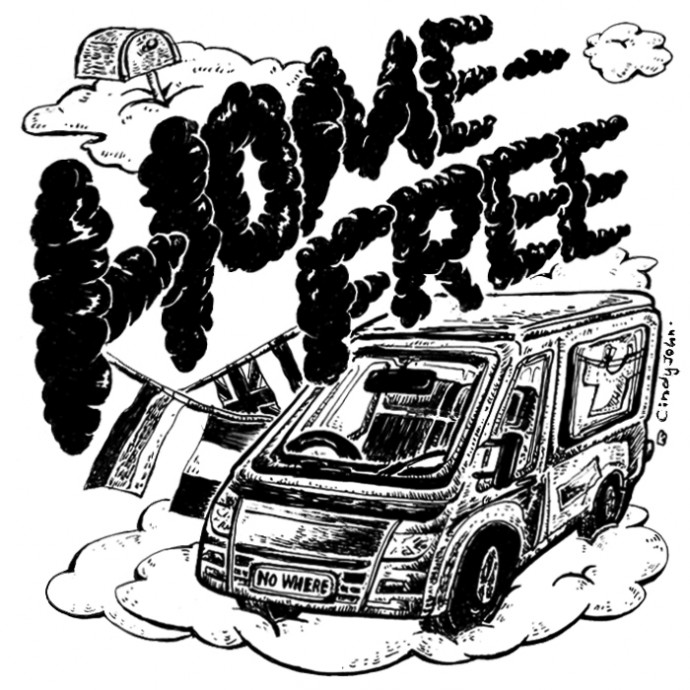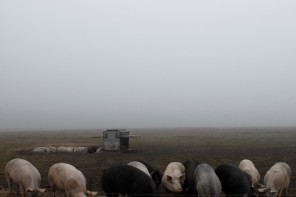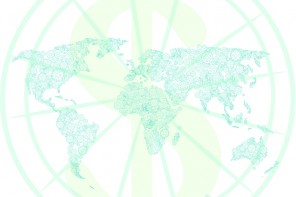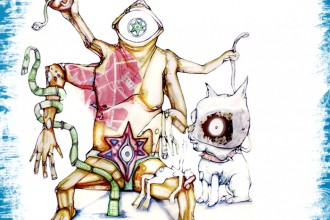What is home? For many people, it’s the place they grew up. The country they come from, coupled with the language they speak. For Leila Bacchiocchi, the concept of ‘home’ is constantly evolving. When she was very young, her parents decided they wanted more for her than society was providing. The three of them downsized and moved into a van, travelling from place to place, changing countries and learning new languages. Leila talks to Sensa Nostra about being ‘home-free’ and what that meant for her growing up, the values her parents instilled in her, and her perspective on the world now.
When I was two years old my parents moved to the south of France, in the Pyrenees, where my dad bought an old circus van which he converted himself. The van was 2,5m wide and 6m long. Compared to other homes it was tiny, but to me it was normal because the van was my home and we had everything we needed, just in a smaller version. It had three big windows and the living space was mostly built from wood and bamboo, which gave it a very cozy feeling. In the winter we used to have a small wood burner oven to heat the van. We moved around a lot, living in the south of France, Italy, and the south of Spain. Most of the places we stayed were in the countryside or small villages.
For electricity we had a small solar cell for the light in the evening, but only if in the daytime the sun would shine, otherwise we had to light with candles. For water, because we always lived in small villages and stayed for longer in one place, my dad used to build a small outside toilet and we used to get water from the neighbours. The winters were hard because we didn’t have a washing machine and we had to wash everything by hand. This is one of the reasons we decided to move to the south of Spain—the winter is much shorter and warmer there.
My mother was born in a small village in southern Germany, near Baden-Baden. At the age of twenty-six she decided she needed a change in her life and decided to go on a journey by bicycle that took her six months. Starting in Germany, passing through France, Spain, and Portugal, she finally reached Morocco, where she met my dad and decided to stay for the next eight years. My dad is from Italy, but he grew up in Switzerland because his parents moved there to work when they where young. At home my parents speak mainly German, which is also my first language. I learned other languages like Spanish, Italian, French, and English while we were traveling, and in my opinion it is much easier to learn a language as a child.
Because of this history, people often ask me, “Where are you from?” Indeed it is a difficult question to answer, because I don’t have the feeling I belong to any country or culture in particular.
My parents made the decision to live in a van in order to avoid rental costs and because it was a good and easy way to have our home with us wherever we went. Before I was born, they decided to resign from a life in society and live a simple life because they agreed that living this way would make it easy to focus on the values one needs to be happy.
My parents tried to live a simple and happy life which was not bound to the roles of society. This is one of the reasons they decided against sending me to school. I was home-schooled by my mother, who taught me to read and write. Perhaps I didn’t learn as fast as I would have if I had gone to a regular school, but she tried to teach with the feeling that learning isn’t an obligation. She got me interested in learning by having me write letters to friends or by writing the shopping list. She tried as much as possible to involve me in her daily life because she believed that children learned quicker by doing, instead of only learning the theory in books. I was surrounded by children where we lived and always made friends. It was easy to get to know other children because we always lived in small villages or in the countryside.
My parents taught me to become a self-confident, responsible person. They showed me that money is not the most important thing in life and that happiness doesn’t follow material possessions. They raised me to be respectful to others and to be open-minded. They always told me it is important to be happy with the things you do otherwise it may not be the right thing. I am very glad I grew up in this way, and I thank my parents for showing me this way of life and educating me to become the person I am now.
I never felt that I was different from anyone else as a child, but as I grew older I had some confrontations with my grandparents, who wished that I had been brought up differently, with prospects for a different future. They wanted me to have a stable childhood—that means going to school, studying, and later working, buying a house and a car… At last they accepted that they couldn’t change us, and I think eventually they also learned from us.
I never really had any negative experiences with other people about how we lived; only sometimes they couldn’t understand why we chose to live without television, electricity, eating meat, or why my parents wouldn’t send me to school. But I guess it is just because it was new for them, and the way we lived had always been connected with poverty.
Moving to different places so many times as a child has contributed to my having an open mind and having a different opinion of other lifestyles. I believe that travelling increases tolerance and reduces prejudice towards other people, their cultures, and lifestyles. One negative aspect of living in a van and moving to so many places is that each time we moved, we had to leave everything behind and start all over again at the new place. I always found it hard to leave my friends behind, especially when I was eight, when we moved to Spain.
At the age of nineteen, I left the van and the countryside and moved to town to rent a flat. I wanted to experience living as part of society and have the opportunity to go to school. It was a whole new experience for me—having all the commodities of a flat can be very convincing! I started going to evening school and at the age of twenty-one I moved to Berlin, which was a big change because I’d never lived in a city before. For now, I love living in Berlin, and the city offers many more opportunities than a small village. I always try to balance the values of the lifestyle my parents taught me, whilst living in the midst of our society. In my opinion, society focuses on the wrong values to make people happy. Right now I’m working in a cafe so I can afford the expensive city life. In October I will start studying cultural studies. Friendship and the connections between people are important. It keeps me open-minded—especially the connection with people from different backgrounds and different cultures.
My most important aim is to live a simple, happy life and find a balance between the outside and the inside; finding a way to follow my own goals, even though this isn’t always easy because society teaches us other values. I try to conserve the values my parents showed me. They always told me, “Whatever you do you carry responsibility, and it is your responsibility to enjoy what you are doing. And if that’s not the case, maybe you should think about what makes you unhappy and change it.”







